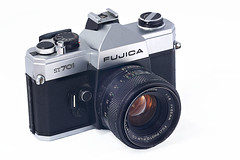Difference between revisions of "Fujica ST701"
Hanskerensky (talk | contribs) (Changed Lay-out and links) |
m (silicon, not silicone) |
||
| Line 10: | Line 10: | ||
The '''Fujica ST701''' is a fully-manual [[SLR|single-lens reflex]] camera first produced by [[Fuji|Fuji Photo Film]] from 1971. It uses the [[42mm screw mount|42mm screw lens mount]]. | The '''Fujica ST701''' is a fully-manual [[SLR|single-lens reflex]] camera first produced by [[Fuji|Fuji Photo Film]] from 1971. It uses the [[42mm screw mount|42mm screw lens mount]]. | ||
| − | The ST701 has a stop-down, match-needle [[TTL]] metering system that uses two silicon photo diodes, and was the first camera design to abandon CdS cells in favor of faster and more sensitive | + | The ST701 has a stop-down, match-needle [[TTL]] metering system that uses two silicon photo diodes, and was the first camera design to abandon CdS cells in favor of a faster and more sensitive silicon photo-diode. Metering needle indicators are displayed in the viewfinder, which is exceptionally bright. The camera's [[focal-plane shutter]] has speeds of 1 to 1/1000 sec. The [[flash sync]] speed is 1/60. The camera has two connectors for flash, the top one is for FP and the bottom is for X. The finder screen has a [[microprism]] to aid in focusing. The camera's meter is powered by mercury batteries, but unlike many cameras of the time, it simply will not work at all with higher voltage modern batteries. |
There were three versions of this camera. The image to the right is the first version. The second version had an engraved, rather than raised penta-prism housing logo. The camera below is the third version, which added a hot shoe and split-image rangefinder focusing spot. The ST701 was one of the first 35mm SLR cameras to feature a hot shoe. | There were three versions of this camera. The image to the right is the first version. The second version had an engraved, rather than raised penta-prism housing logo. The camera below is the third version, which added a hot shoe and split-image rangefinder focusing spot. The ST701 was one of the first 35mm SLR cameras to feature a hot shoe. | ||
Revision as of 01:58, 1 May 2015

|
| black ST701 image by Lars Holmberg (Image rights) |
The Fujica ST701 is a fully-manual single-lens reflex camera first produced by Fuji Photo Film from 1971. It uses the 42mm screw lens mount.
The ST701 has a stop-down, match-needle TTL metering system that uses two silicon photo diodes, and was the first camera design to abandon CdS cells in favor of a faster and more sensitive silicon photo-diode. Metering needle indicators are displayed in the viewfinder, which is exceptionally bright. The camera's focal-plane shutter has speeds of 1 to 1/1000 sec. The flash sync speed is 1/60. The camera has two connectors for flash, the top one is for FP and the bottom is for X. The finder screen has a microprism to aid in focusing. The camera's meter is powered by mercury batteries, but unlike many cameras of the time, it simply will not work at all with higher voltage modern batteries.
There were three versions of this camera. The image to the right is the first version. The second version had an engraved, rather than raised penta-prism housing logo. The camera below is the third version, which added a hot shoe and split-image rangefinder focusing spot. The ST701 was one of the first 35mm SLR cameras to feature a hot shoe.

|
| silver model image by Kimmo Kulovesi (Image rights) |